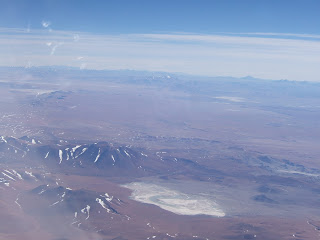 |
| Punta Delgada, Península Valdés |
I've been back in Oregon for a month and a half now, more or less (the precise day count seems unimportant) and, as usually happens with completed travel, the time away and the places visited--and, sadly, the people--seem increasingly remote, a little unreal, my own personal fairytale, once upon a time I went. . . where was that? Was that me?
I borrowed the phrase "remote, named places" years ago from a book by Sheldon Annis, God and Production in a Guatemalan Town (U. of Texas Press); I used it as the title for a poem, thinking about particular journeys and specific distances. I still like the idea, the combination of the remote--unreachable, far, distant, isolated--that nonetheless is named; named and thus claimed, appropriated, understood, collected, mislabeled, domesticated, pulled close: any or all of the above. Yes, the phrase is taken out of context. For poem-titling, that seems fair. More than that, no writer can anticipate what combination of four or twenty words will resonate for a given reader, or how long the echo will last.
We packed a lot of traveling into the last few weeks in Argentina. It's a huge country (there's that
remote idea again) but the buses are comfortable and the timetables are set to make the most of nighttime travel on a trip of 12 or 20 hours. I came home with a fistful of plans for catch-up writing: the trip to Iguazú Falls, a destination I wrote about early in the life of this blog (
Iguazú Words) as a still-imaginary place that I had never visited. It's not imaginary anymore. Peninsula Valdés (think wide-open spaces, whales, seals, aquamarine against straw against wind). Capilla del Monte, now that my in-house tech genius has rescued my picture files. Buenos Aires with sweaty, tired kids who perked up enough to appreciate the fossils in the marble banisters at the Teatro Colón.
I'll get to them, or most of them (I hope). But tonight, listening to it rain, I'm caught in the both/and, either/or of remote naming, of immediate nostalgia, of travel reimagined after the fact, at one or two or three removes.
Remote, Named Places
Imaginative cartographers once wrote
here there be tigers
over stretches of unbroken vegetation.
My father loves this line.
He splashes it through his drink
and into the spaghetti like a sponge
making the inconceivable, real
the incomprehensible, home
and for this we follow him into the jungle,
camp where he declares the water clear,
tie ourselves onto mountains
as though our own bodies were the heaved rock
and as our skin burns in stripes through the incomplete masking
he says again, "here there be tigers"
and we roar.
He calls directions
(there is a compass in his head)
and we follow--"step here and there and there"--
the names of each destination
rolling in the pocket like a charm on a bracelet
plump knoll of silver at your wrist
and at night as the fire hisses
we lay them at his feet like rags
washing our frustration
but also trophies, marking the glow
of the last flame before he kicks it out,
marking the sole star we try to photograph and miss,
marking the sunrise we watch from our tent door,
still cased in the down where we sleep.

We tread the short-cut like dancers
who believe the high wire is the shortest path between two points
but when we demand an explanation for delay
he mutters that the cut gets shorter later on.
My father's shoulders are thick, front to back,
and a child's head can rest without overlap,
wind fully blocked as by a wall. On the trail
he eats from small plastic cups, horizons
almost hidden in the lines of his hand
but at home, the maps torn and dirtied on the floor
he toasts the geographers
as the crystal sings in his grip like fire.
















